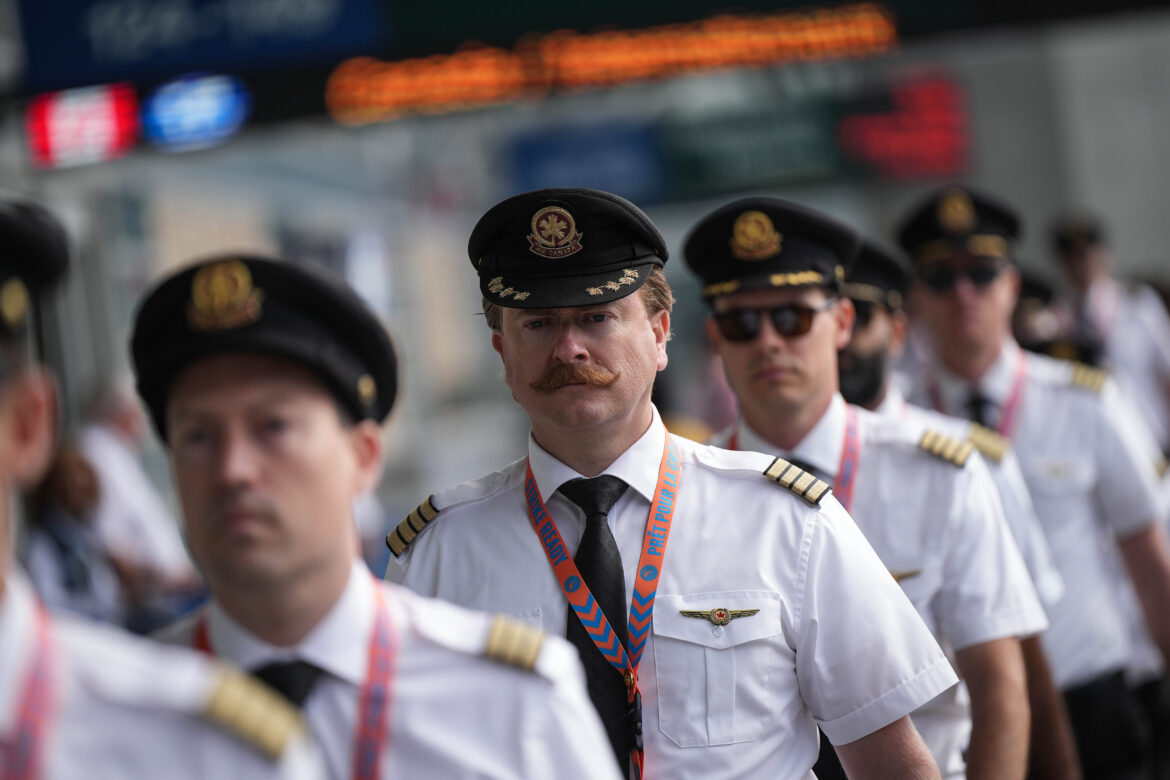Air Canada and business leaders are asking Ottawa to be ready to intervene in the airline’s labour talks with its pilots with time running out before a potential shutdown, but so far the government has said the two sides need to work things out themselves.
On Thursday, the airline urged the federal government to be ready to step in with arbitration to avoid the major disruption a shutdown would cause for its more than 110,000 travellers a day.
“While we remain committed to reaching a negotiated settlement with(the Air Line Pilots Association), the federal government should be prepared to intervene if talks fail,” chief executive Michael Rousseau said in a statement.
The airline says it’s pushing for a deal but “unreasonable wage demands” by pilots are holding up talks.
The Air Line Pilots Association, representing more than 5,200 Air Canada pilots, has said it’s corporate greed that’s hindering talks, as Air Canada continues to post record profits while expecting pilots to accept below-market compensation.
“The onus really at this point is on Air Canada to come to the table with us and bargain, instead of relying on federal intervention to interfere,” said Jesse Jantzi, vice chair of the Air Canada master executive council.
He said he was disappointed the airline is pushing for the government to step in, and that the union has made significant strides in trying to reach an agreement that provides success for both parties.
“While the 18th is rapidly approaching, I do believe that there is still time to avoid any sort of work stoppage.”
The two sides will be in a position starting Sunday to issue a 72-hour notice of a strike or lock out. The airline has said the notice would trigger its three-day wind down plan and start the clock on a full work stoppage as early as Sept. 18.
Numerous business groups gathered in Ottawa on Thursday to also call for action — including binding arbitration — to avoid the economic disruptions a shutdown would cause.
Arbitration “can help bring the parties to a successful resolution and avoid all the potential impacts we’re here to talk about today,” Candace Laing, president of the Canadian Chamber of Commerce, told a news conference.
“Canada cannot afford another major disruption to its transportation network. A labour disruption at Air Canada would ripple through our economy,” Goldy Hyder, chief executive of the Business Council of Canada, said in a statement.
The federal government however has said it’s up to the airline and union tohammer outa deal.
“We remain firm that the best deals happen at the bargaining table, and that’s where parties need to keep working,” said Prime Minister Justin Trudeau on Thursday.
He said Labour Minister Steven MacKinnon would be meeting with the company and union Thursday evening to impress the fact that millions of Canadians are counting on the two sides to get this resolved.
MacKinnon had said Wednesday that there’s no reason the two sides can’t make a deal. He also said there are significant differences in this case compared with the twin rail disputes in August, where the federal government did quickly intervene to restore operations.
NDP Leader Jagmeet Singh said Thursday morning the party would not support efforts to force pilots back to work.
“We are opposed to Justin Trudeau and the Liberals, or any government, interfering with workers,” he said.
Conservative leader Pierre Poilievre said Wednesday that Air Canada should negotiate in good faith with its pilots.
“We’re not going to support pre-empting those negotiations. We stand with the pilots and their right to fight for a fair deal, good wages.”
There is less pressure for politicians to respond to this labour dispute compared with other recent instances such as the railway shutdowns, or the WestJet strike that happened during peak season, said John Gradek, who teaches aviation management at McGill University.
“This is not peak summer travel, this is not Canada Day weekend, this is off-season.”
He said that for the government to request binding arbitration requires a clear and precise threat to the Canadian economy, and while business groups are arguing that’s the case, he doesn’t think so.
“This is not an economic emergency in Canada, even though some organizations might think it is. It is not, and it’s one where as far as I’m concerned, we should let the bargaining process continue.”
— With files from Jim Bronskill in Ottawa



